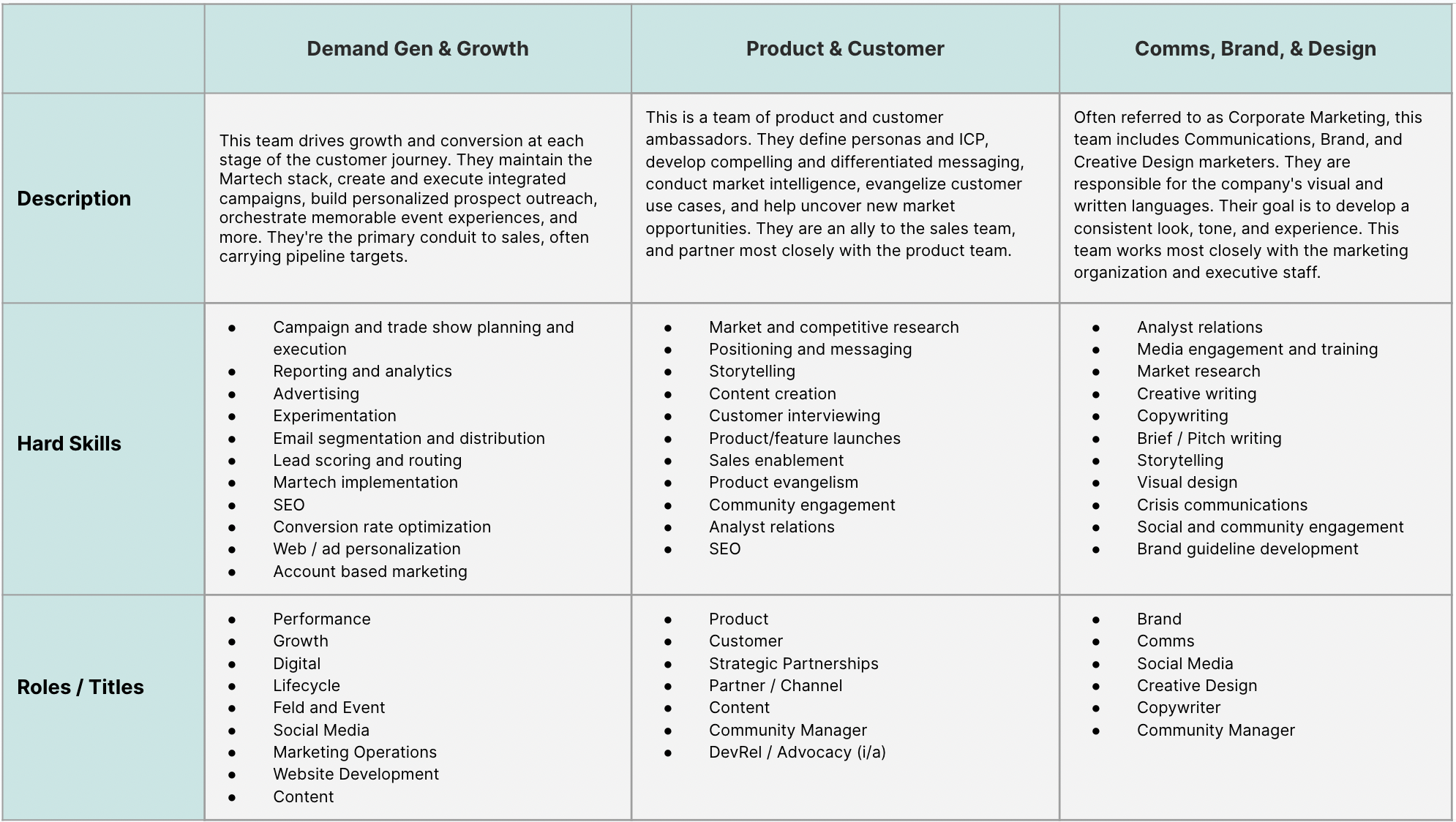So, it’s time to bring on your first marketer. But where do you start?
I’ve spent my entire career in B2B software marketing. I’ve led marketing teams at early-stage startups like Tailscale, Gremlin, and Vanta, and growth-stage companies like Atlassian. For the last few years, I’ve also advised dozens of founders and marketers through various stages of their GTM journey.
This guide provides comprehensive strategies for identifying the right profile for this business-critical hire. Bringing on the right person in this role can have an early outsized impact, and unlock growth for years to come.
Where Do You Start?
Your favorite answer: ‘it depends’. You probably hear this often from investors, advisors, and other founders, but the reality is…there is no one-size-fits-all solution for hiring your initial marketer. In addition to your stage, likely product-market fit as defined in the Science of Scaling, we need to understand other key attributes about your business. There are some common patterns that I’ve observed from early stage founders, but when a founder asks ‘who should I hire?’ I respond with follow up questions to help us identify the right profile:
- What are you trying to solve with this hire?
- What’s driving you to hire this role now?
- What’s your GTM motion?
- How important is it that this person knows your industry/vertical and personas?
- What will this person be responsible for, and how will you measure their success?
Be Specific About Hard Skills
Marketing is extremely multi-faceted. There are several different schools of marketing, commonly referred to as the ‘3 legged stool’. I’ve also heard it described as two minds: art and science, or as one founder told me, heart and brain. Regardless of the moniker, there are differences between functional responsibilities and thus, experiences, and it’s important to understand how these shape the ideal profile for your first marketing hire.
In addition to core marketing skills (hard skills), you should be hiring for stage fit - for example, someone who can operate independently with little to no guidance, exhibits a growth mindset, communicates clearly and concisely, is comfortable with ambiguity, and will do vs delegate.
Marketing Responsibilities
Below is a snapshot of B2B software marketing functions and roles within them. While a rather consistent view of what I’ve experienced, marketing organizational structures vary by company.

Be Clear About Your GTM Motion
You might think this sounds obvious, but it’s important to be clear about how you plan to take your product to market and who your primary personas are before you start writing the marketing job description. This ensures that you find candidates who align with your model.
We think of GTM motions in three categories:

If you’re in GTM 1, bringing on your first marketer who’s only operated in GTM 3 will present challenges very early into their tenure. Why? They likely won’t come in with a playbook for enterprise marketing, probably haven’t partnered closely with a sales organization, and most likely have not conducted hours of customer interviews.
Let me give you an example: I worked at one of the most successful PLG companies, Atlassian, for 7 years. The initial marketing team punched above their weight. They excelled at messaging, user-empathy, content creation, and developing viral campaigns that drove thousands of users inbound at little to no cost. But what they were not doing was building first call decks, running account-based marketing, or diagnosing pipeline anomalies. We didn’t even have a CRM when I joined. We eventually built out an Enterprise marketing function with all of the supporting responsibilities and systems, but the initial marketing team, and a large part of the marketing organization when I left, was focused on fueling a high-volume flywheel.
Be clear about your GTM motion, and try to find and recruit marketers who have operated in a similar model.
Avoid the Potholes
Hiring your first B2B marketer is difficult to get right. Not because it's hard to find talented candidates, but because marketing is so multi-faceted and experience matters. Below are three common failure modes we’ve seen when early stage founders mis-hire.
They have an incompatible background
Before you bring someone onboard, be explicit about your needs today and over the next 12 months, and how you plan to take your product to market.
A great demand generation marketer will be able to look at the engagement and interaction that's happening at the top of the funnel and make informed hypotheses and recommendations on ways to improve reach, impressions, click-through rates, and ultimately conversions. But they need a partner to develop the content that they’re promoting, and create core messaging and use cases to modify ad copy and set keyword bids, for example. A great sales-led marketer will be able to produce excellent sales enablement, but probably won’t know how to approach new user activation, for example.
You’re searching for a unicorn
Of course finding your Swiss army knife, or unicorn, is the ultimate goal but let’s be honest, they’re called a unicorn for a reason: someone who spikes in each of the core marketing areas probably doesn't exist in the real world. What you will find is a generalist; someone who is good in a lot of different areas but may not specialize in any one. This may be helpful if you need help with a range of deliverables, but you may end up in a situation where you outgrow that generalist pretty quickly, especially if you don’t have somewhere for them to land.
They lack, or over-rotate on, technical / industry expertise (edge case)
While more of an edge case, we have seen misalignment with technical aptitude or industry expertise. Let’s assume you’re building a highly technical infrastructure product. Finding a marketer who has spent time in this space, understands how the technology works, is familiar with the competitive landscape, and knows the developer and IT personas intimately, puts them at an advantage over candidates who may have only marketed to other marketers, for example.
How much does this really matter for your company? That’s ultimately a conversation worth having internally, and with advisors/investors who can keep you honest.
My (potentially controversial) Hot Take
So yes, while ‘it depends’ on several attributes noted above, there are some common patterns that I hear from early-stage founders. Most tell me that they need to define or refine their ICP (yes, you will refine it at some point), develop unique value propositions and core messaging, and create content that attracts their ICP. When I ask about content to hear the following themes: blogs, customer stories, website copy, oh, and sales enablement. Based on this criteria, it sounds like these founders are looking for someone who’s spent most of their time in a product marketing role.
The other advantage of bringing on someone with a product marketing background is that they understand go-to-market in a really unique way - they have spent a lot of their career developing product or feature launch plans, so they should come in with a launch playbook that organizes all of the moving pieces for how to introduce a feature to their core audience, including the channels required. Product marketers have launching in their DNA, and any great product market should be good at content creation. This not only helps them find moments for your company to announce, they’re also great at managing and executing on launch deliverables.
If you were to ask me what type of marketer I would recommend for your startup, I will say ‘it depends’ and follow up with several questions. But my hot take is if you get one shot on goal for your first marketing hire, it may behoove you to find somebody who has come up through a product marketing background. And someone comfortable managing contractors/agencies who can complement them on performance marketing.
Interviewing B2B Marketing Candidates
Now that you have defined the ideal candidate profile - the hard skills, soft skills, GTM experience, and industry/vertical expertise are clear - you are ready to build the job description, start filling your candidate pipeline, and interviewing. We’ve prepared a B2B marketing interview scorecard to help eliminate bias and keep you focused on the skills you are assessing.
Get Support: Leverage Startup Marketing Advisors for You, and for Them
If you’ve never managed a marketing function before, lean on someone who has. Not just for you, but for your first marketer. We would encourage you to find a marketing advisor for your startup who you trust to support you while you learn the function and set realistic goals and expectations, and support them as they navigate their new role. Startup marketing advisors provide coaching through weekly or monthly 1:1s, strategic planning support, and more. I recommend that you review Startup Founders: How to Find the Right Advisor for your Business.
Resources for Hiring GTM Teams
Below are few related resources from our blog that we’d recommend:
- Hiring the First Marketing Team
- Hire and Retain GTM Talent
- Playbook to Hiring Your First Sales Leader
Emily Kramer from MKT1 wrote a great article called How to Hire Your First Marketer. We recommend you take a look at that too.

.png?width=760&height=550&name=Hiring%201st%20Marketer%20(6).png)